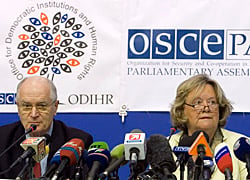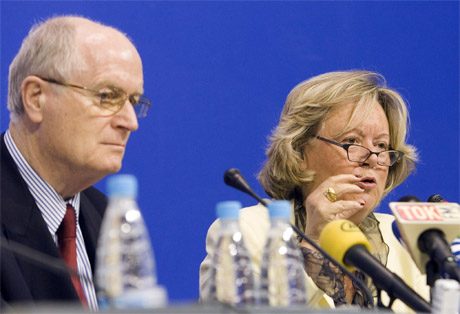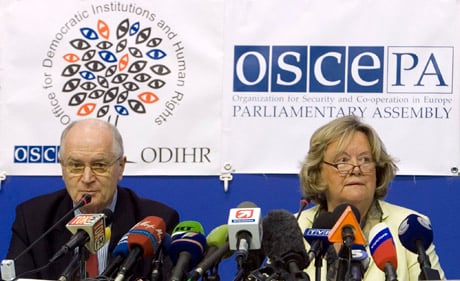OSCE observers didn’t recognise “elections” in Belarus (Photo)
56- 29.09.2008, 15:38

The OSCE/ODIHR monitoring mission didn’t recognise the “parliamentary elections” in Belarus free and democratic. OSCE observers noticed vote counting was “bad or very bad” in 50 per cent of cases. 40 per cent of observers said they had had difficulties with access to vote counting. The elections ultimately fell short of OSCE standards.
OSCE recommendations weren’t fulfilled. Observers note that votes counting was held behind the closed doors. Observers had no access to vote counting, process of monitoring the “elections” was complicated, facts of rigging the voting results were noticed. We have all grounds to think strict administrative control was exercised over the electoral process. A subjective of an electoral campaign is offering choice for voters. However, electoral freedom was restricted by the Belarusian authorities, said Anne-Marie Lizin, Vice President of the OSCE Parliamentary Assembly and Special Co-coordinator of the OSCE short-term observers.
A third of the observers said they had had no access to the monitoring, 40 per cent of the observers said they hadn’t been able to observe the vote counting in full. Transparency of the electoral campaign was very low. The Belarusian authorities need changes in order for the country to set a course of democratisation and progress, Vice President of the PA OSCE Anne-Marie Lizin noted.
Geert-Hinrich Ahrens, head of the OSCE/ODIHR election observation mission said he was disappointed in the running and results of the “parliamentary elections” in Belarus. According to him, “we were unable to see a problem solved that has been with election observation in this country for a long time, and that is the non-transparency of the vote count”. Mr Ahrens noted that OSCE observers had recorded violations at all stages of the electoral campaign.


Press release
Parliamentary elections in Belarus fell short of OSCE commitments in spite of minor improvements, observers say
MINSK, 29 September 2008 - Despite some minor improvements, the 28 September parliamentary elections in Belarus ultimately fell short of OSCE commitments for democratic elections, international observers from the OSCE concluded in a preliminary statement issued today.
The election took place in a strictly controlled environment with a barely visible campaign, said the observers from the OSCE Office for Democratic Institutions and Human Rights (ODIHR) and the OSCE Parliamentary Assembly (OSCE PA).
Voting was generally well conducted, but the process deteriorated considerably during the vote count. Promises to ensure transparency of the vote count were not implemented. The count was assessed as bad or very bad in 48 per cent of polling stations visited. Where access was possible, several cases of deliberate falsification of results were observed.
OSCE monitors were prevented or hindered from observing the vote count in 35 per cent of cases. This compromised the transparency of this fundamental element of the election process.
"The clear signals to improve the election process were not implemented and substantial improvements are required if Belarus is to conduct genuinely democratic elections in line with our common OSCE commitments. Unfortunately the repeated signals of good will did not seem to have been correctly given or received. Consequently the significant progress we hoped for in the democratic development of Belarus did not materialize," said Anne-Marie Lizin, Vice President of the OSCE Parliamentary Assembly and Special Co-ordinator of the OSCE short-term observers.
"I'm hopeful and disappointed at the same time. Hopeful because when we came here it seemed that there was some wind of change in the election environment; disappointed because we were unable to see a problem solved that has been with election observation in this country for a long time, and that is the non-transparency of the vote count. But we hope that the improved co-operation we have experienced during this election can be the basis for a genuine dialogue on implementing our recommendations", said Ambassador Geert Ahrens, Head of the OSCE/ODIHR election observation mission.
Positive developments included the slightly increased access of opposition representatives to election commissions, the decision to rebroadcast once the five-minute candidate spots during prime time, and the recommendation to seal ballot box slots overnight during the five-day early voting period. Some opposition candidates noted progress in their ability to conduct meetings in authorized locations without interference.
The legislative framework continues to present obstacles for elections in line with OSCE commitments. The media coverage of the campaign did not provide meaningful information for voters to be able to make an informed choice. Political parties played a minor role, and restrictions imposed by the state authorities did not allow for a vibrant campaign with real competition.
The OSCE deployed some 450 international observers from 43 countries, including more than 320 short-term observers and 58 experts and long-term observers fielded by ODIHR, as well as 66 parliamentarians and staff from the OSCE PA.
Preliminary conclusions of the OSCE elections monitoring mission










